Federal government releases sustainable jobs plan
Fri, February 17, 2023
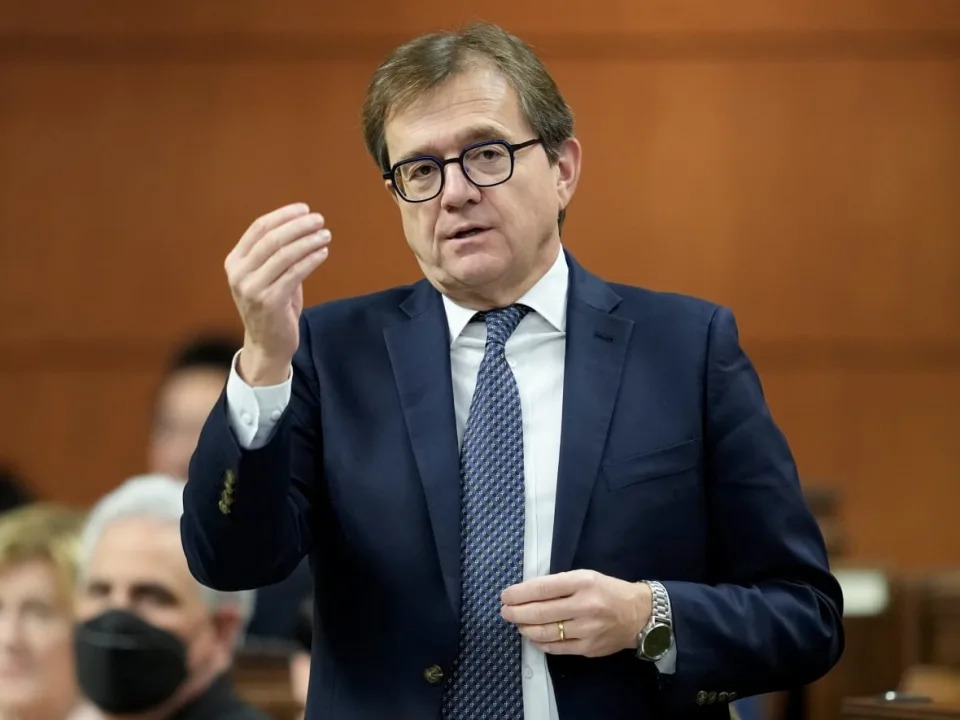
Natural Resources Minister Jonathan Wilkinson speaks during question period, in Ottawa, in a file photo from 2022. Wilkinson led development of the government's sustainable jobs plan, which was released Friday. (Adrian Wyld/The Canadian Press - image credit)
The federal government on Friday released a plan to create sustainable jobs that aims to transition workers away from the fossil fuel industry and toward clean energy.
The interim plan, which will guide the government's "just transition" approach from 2023 to 2025, includes the establishment of a new training centre for sustainable jobs and a new government advisory body. The government will develop a full sustainable jobs plan every five years starting in 2025.
"Canada has what it takes to become the clean energy and technology supplier of choice in a net-zero world," Jonathan Wilkinson, the minister of natural resources, said in a news release.
"With this plan, the federal government is taking yet another step forward to ensure that Canada's workers have the skills and support necessary to seize this generational opportunity."
The 32-page plan comes more than three years after the federal Liberals promised a strategy to protect jobs as Canada adjusts from a combustion-energy powerhouse to a clean-energy economy.
The plan does not set a job creation target or predict how many jobs it will create in the sustainable energy sector. The government news release points to a Royal Bank of Canada report that says Canada could add up to 400,000 clean energy jobs through its efforts to transition to net zero.
The plan comes after two years of government consultation with provinces and territories, industry, Indigenous peoples, unions and other stakeholders.
The government's plans to move to a clean energy economy have prompted criticism among some Alberta government officials, including Premier Danielle Smith. Smith has said the "just transition" plan will eliminate jobs in Alberta's oil and gas sector, and Alberta NDP Leader Rachel Notley has called on the federal government to drop transition legislation it plans to introduce later this year.
On Thursday, Smith wrote to Prime Minister Justin Trudeau asking him to put the plan on ice because it poses "an unconstitutional and existential threat to the Alberta economy and the jobs of hundreds of thousands of Albertans."
But the plan says a labour shortage is more of a concern than unemployment among energy workers.
"According to numerous studies, rather than a shortage of jobs, in Canada we are much more likely to see an abundance of sustainable jobs with a shortage of workers required to fill them," it reads.
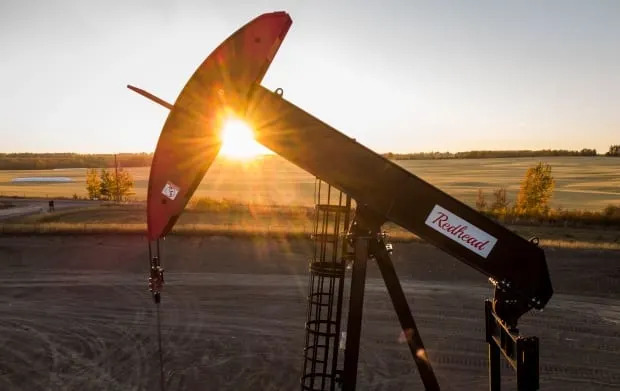
jeff McIntosh/The Canadian Press
The federal government has set targets of reducing Canada's greenhouse gas (GHG) emissions to 40 per cent below 2005 levels by 2030 and reaching net-zero emissions by 2050.
"Around the world, financial markets are increasingly pricing climate risk into investment decisions. Smart money is flowing away from assets that are not compatible with a transition to a net-zero world, and towards opportunities that are," the plan reads.
"We need to skate to where the puck is going."
"What Canada needs now is a dedicated plan for workers in a net-zero future. A plan that outlines how we will keep workers at the heart of Canada's energy sector for decades to come. A plan to create jobs, to create prosperity."
The document says the government will introduce legislation later in 2023 which will lay out the government's plans on accountability, engagement and transparency on the transition to sustainable jobs.
"We're pleased that the Liberal government is recognizing the huge opportunity of embracing a clean energy future," Charlie Angus, the NDP critic for natural resources, said in a media statement.
"But the question is whether or not the government will back up these positive words with the massive investments required to kick-start a clean energy future."
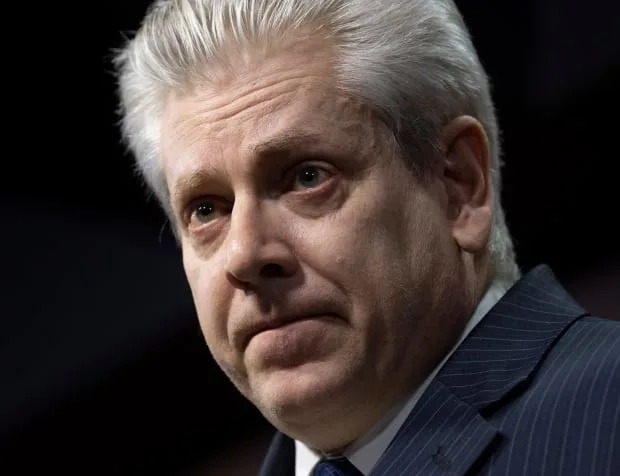
Adrian Wyld/The Canadian Press
The plan says global demand for oil will be down 75 per cent by 2050, and demand for gas will be about half of what it is today. But it also says oil and gas will be needed for non-combustion uses, such as plastics, solvents, lubricants and waxes.
Amara Possian of 350.org, an environmental organization, said the plan doesn't go far enough.
"This plan leaves too much room for the fossil fuel industry to block progress. Taking the climate emergency seriously means no more public money for false solutions like carbon capture, utilization and storage that will only lock workers into the dying fossil fuel era," she said in a media statement.
"Canadians deserve a plan that aligns with climate science, guarantees a good, unionized, green job to anyone who wants one, and puts people first, not corporate profits."
Fri, February 17, 2023

Natural Resources Minister Jonathan Wilkinson speaks during question period, in Ottawa, in a file photo from 2022. Wilkinson led development of the government's sustainable jobs plan, which was released Friday. (Adrian Wyld/The Canadian Press - image credit)
The federal government on Friday released a plan to create sustainable jobs that aims to transition workers away from the fossil fuel industry and toward clean energy.
The interim plan, which will guide the government's "just transition" approach from 2023 to 2025, includes the establishment of a new training centre for sustainable jobs and a new government advisory body. The government will develop a full sustainable jobs plan every five years starting in 2025.
"Canada has what it takes to become the clean energy and technology supplier of choice in a net-zero world," Jonathan Wilkinson, the minister of natural resources, said in a news release.
"With this plan, the federal government is taking yet another step forward to ensure that Canada's workers have the skills and support necessary to seize this generational opportunity."
The 32-page plan comes more than three years after the federal Liberals promised a strategy to protect jobs as Canada adjusts from a combustion-energy powerhouse to a clean-energy economy.
The plan does not set a job creation target or predict how many jobs it will create in the sustainable energy sector. The government news release points to a Royal Bank of Canada report that says Canada could add up to 400,000 clean energy jobs through its efforts to transition to net zero.
The plan comes after two years of government consultation with provinces and territories, industry, Indigenous peoples, unions and other stakeholders.
The government's plans to move to a clean energy economy have prompted criticism among some Alberta government officials, including Premier Danielle Smith. Smith has said the "just transition" plan will eliminate jobs in Alberta's oil and gas sector, and Alberta NDP Leader Rachel Notley has called on the federal government to drop transition legislation it plans to introduce later this year.
On Thursday, Smith wrote to Prime Minister Justin Trudeau asking him to put the plan on ice because it poses "an unconstitutional and existential threat to the Alberta economy and the jobs of hundreds of thousands of Albertans."
But the plan says a labour shortage is more of a concern than unemployment among energy workers.
"According to numerous studies, rather than a shortage of jobs, in Canada we are much more likely to see an abundance of sustainable jobs with a shortage of workers required to fill them," it reads.

jeff McIntosh/The Canadian Press
The federal government has set targets of reducing Canada's greenhouse gas (GHG) emissions to 40 per cent below 2005 levels by 2030 and reaching net-zero emissions by 2050.
"Around the world, financial markets are increasingly pricing climate risk into investment decisions. Smart money is flowing away from assets that are not compatible with a transition to a net-zero world, and towards opportunities that are," the plan reads.
"We need to skate to where the puck is going."
"What Canada needs now is a dedicated plan for workers in a net-zero future. A plan that outlines how we will keep workers at the heart of Canada's energy sector for decades to come. A plan to create jobs, to create prosperity."
The document says the government will introduce legislation later in 2023 which will lay out the government's plans on accountability, engagement and transparency on the transition to sustainable jobs.
"We're pleased that the Liberal government is recognizing the huge opportunity of embracing a clean energy future," Charlie Angus, the NDP critic for natural resources, said in a media statement.
"But the question is whether or not the government will back up these positive words with the massive investments required to kick-start a clean energy future."

Adrian Wyld/The Canadian Press
The plan says global demand for oil will be down 75 per cent by 2050, and demand for gas will be about half of what it is today. But it also says oil and gas will be needed for non-combustion uses, such as plastics, solvents, lubricants and waxes.
Amara Possian of 350.org, an environmental organization, said the plan doesn't go far enough.
"This plan leaves too much room for the fossil fuel industry to block progress. Taking the climate emergency seriously means no more public money for false solutions like carbon capture, utilization and storage that will only lock workers into the dying fossil fuel era," she said in a media statement.
"Canadians deserve a plan that aligns with climate science, guarantees a good, unionized, green job to anyone who wants one, and puts people first, not corporate profits."
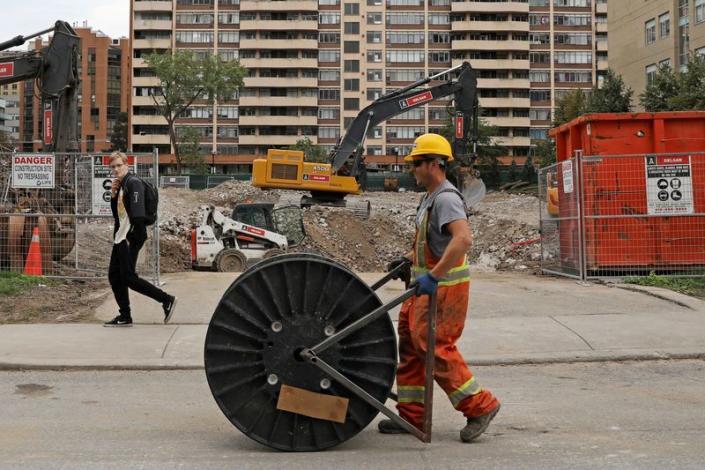
A construction worker passes a condominium site with a roll of cable in Toronto
Nia Williams
Fri, February 17, 2023
By Nia Williams
(Reuters) -Canada on Friday released a long-awaited sustainable jobs plan, laying out how the federal government plans to help train workers for roles in the coming clean energy economy as the world aims for net-zero carbon emissions by 2050.
The plan, to be followed by legislation later this year, includes steps such as setting up a sustainable jobs secretariat to coordinate government policies and a partnership council to promote consultation with provinces, labour unions and others.
Canada said it is also planning to improve labour market data collection and advance funding for skills development, although the document did not outline any new government spending. From 2025 the government plans to release a new sustainable jobs plan every five years.
"Canada has what it takes to become the clean energy and technology supplier of choice in a net-zero world," Natural Resources Minister Jonathan Wilkinson said in a news release.
Liberal Prime Minister Justin Trudeau has been promising sustainable jobs legislation since 2019. But in Canada, the world's fourth-largest crude oil producer, the concept of retraining workers for clean energy jobs, also called a "Just Transition", became a lightening rod for criticism.
In the crude-producing province Alberta, conservative Premier Danielle Smith has accused Trudeau of wanting to phase out the oil and gas sector.
The Alberta government is "perplexed" by the jobs plan not mentioning a liquefied natural gas export strategy and has "grave concerns" about it not recognising the provinces' right to manage their own natural resources, Smith said in a statement on Friday.
"This kind of dysfunctional communication by the federal government with our province cannot continue if Canada is to have any chance of achieving its 2050 emissions reduction targets," she said.
The federal government said enormous clean energy opportunities are emerging in oil-producing provinces, from hydrogen to critical minerals. There will also be sustainable jobs in conventional energy industries as Canadian producers aim to lower the carbon intensity of their crude, according to the document.
"Rather than a shortage of jobs, in Canada we are much more likely to see an abundance of sustainable jobs with a shortage of workers required to fill them," the plan said.
Think-tanks Clean Energy Canada expects jobs in the sector will grow by 3.4% annually over the next decade, nearly four times faster than the Canadian average.
On Thursday, Smith wrote to Trudeau offering to collaborate with the federal government on developing carbon capture and storage incentives, but only if Ottawa secured Alberta's consent on climate policies that affect oil and gas, including clean energy jobs legislation.
(Reporting by Nia WilliamsEditing by Marguerita Choy and David Gregorio)
Alberta offers to work with Trudeau on carbon capture - with conditions
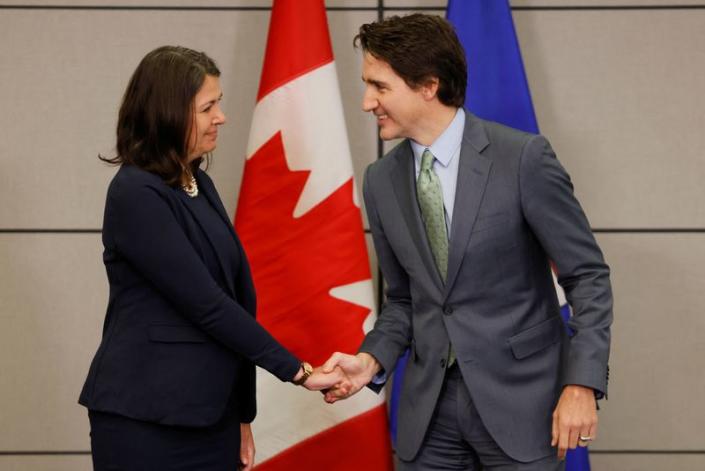
Thu, February 16, 2023
By Nia Williams
(Reuters) -Canada's Alberta province on Thursday offered to collaborate with the federal government to spur carbon capture utilization and storage (CCUS) investments, but only if Ottawa secures Alberta's consent on climate policies that impact oil and gas.
In an open letter to Prime Minister Justin Trudeau, Alberta Premier Danielle Smith said those policies include a proposed oil and gas emissions cap, clean power regulations and legislation to help workers retrain for green energy jobs.
Canada, the world's fourth-largest oil producer, wants to cut carbon emissions 40%-45% below 2005 levels by 2030. The oil and gas sector is the country's highest-polluting industry, accounting for more than a quarter of all emissions.- ADVERTISEMENT -
The country's biggest oil producers, a group known as the Pathways Alliance, want to develop CCUS technology to store emissions underground, but have said they need more public money to help fund the multi-billion-dollar projects.
In her letter, Smith proposed coordinating a federal CCUS income tax credit with an expansion of Alberta's Petrochemicals Incentive Program (APIP) to include CCUS projects.
She also requested the immediate creation of a federal and provincial working group led by ministers that could work on reaching an agreement on a joint incentive program in coming weeks.
However, she said the invitation came with "one non-negotiable condition": that Ottawa holds back on passing legislation or policies impacting the oil and gas sector without Alberta's input and full agreement.
"Although Alberta is willing to work as an active partner with the federal government on a coordinated approach to reducing Alberta's and Canada's net emissions, under no circumstances will our province accept the imposition of arbitrary and unachievable targets or policies that spell the end of meaningful long-term investment in Alberta's energy sector," Smith wrote.
Ottawa already unveiled a CCUS investment tax credit worth C$2.6 billion ($1.93 billion) over the next five years in 2022.
Traditionally conservative Alberta has a testy relationship with the Liberal government in Ottawa.
Smith, who became leader of the United Conservative Party in October vowing to stand up to federal over-reach, is facing a provincial election in May and has accused Trudeau of wanting to "phase out" the oil and gas sector.
In a recent interview, Alberta's environment minister told Reuters tension over the proposed emissions cap was holding up progress on other issues such as CCUS support.
The federal government did not immediately respond to a request for comment.
The Pathways Alliance said it was "encouraged" by Alberta considering an expansion to its petrochemicals incentive program and that Canada needed to compete with U.S. green energy subsidies.
"We look forward to hearing further details from both governments," said Mark Cameron, Pathways' vice president of external relations.
($1 = 1.3461 Canadian dollars)
(Reporting by Nia Williams; Editing by Marguerita Choy, Christopher Cushing and Sonali Paul)
No comments:
Post a Comment